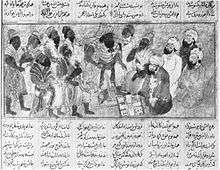Nard (game)
Nard (Persian: نرد, also narde or nardshir; from Middle Persian: nywʾlthšyl nēw-ardaxšīr) is a tables-style board game for two players in which the playing pieces are moved according to rolls of dice. It is similar to backgammon in that it uses the same board, but it has different initial positions and rules.
 Buzurgmihr demonstrates the game of nard to the Indian rajas | |
| Other name(s) | Nardshir |
|---|---|
| Genre(s) | Board game Dice game |
| Players | 2 |
History
The game has been historically popular in Persia, Muslim countries, and among Babylonian Jews. A common legend associates the game with the founder of the Sassanian Dynasty, Ardashir. Indeed, the Persian name نرد nard is a shortening of the older name نردشیر nardašir, from Middle Persian nēw-ardaxšīr "brave Ardashir". The oldest known reference to the game is thought to be a passage in the Talmud, although some claim it refers to the Greek game Kubeia. Another early reference is to be found in the Middle Persian romance Chatrang-namak (written between the 7th and 9th centuries) which attributes the invention of the game to Bozorgmehr. The Shahnameh (written around the year 1000) also attributes the invention to Bozorgmehr.[1]
By the 17th century the game was played in Georgia under the name of nardi, and by the 19th century it was being played by the Kalmucks, who called it narr. During most part of the 20th century both Georgia and Kalmucks were parts of USSR, so now the game is played in Russia and other ex-USSR countries under the name of nardy (нарды). Backgammon in those countries is known as short nard (Короткие нарды).
References
- Shahnameh: The Persian Book of Kings by Abolqasem Ferdowsi, translated by Dick Davis, London: Penguin Books, 2007, Pp. 701-704.